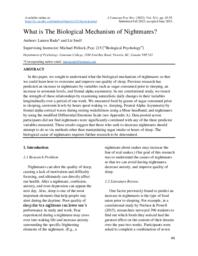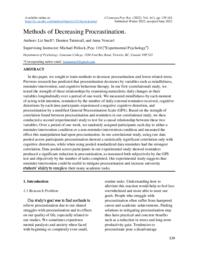Liz Snell
Person Preferred Name
(none provided) (none provided)
Related Works
Content type
Digital Document
Description / Synopsis
In this paper, we sought to understand what the biological mechanism of nightmares so that we could learn how to overcome and improve our quality of sleep. Previous research has predicted an increase in nightmares by variables such as sugar consumed prior to sleeping, an increase in serotonin levels, and frontal alpha asymmetry. In our correlational study, we tested the strength of these relationships by examining naturalistic daily changes in their variables longitudinally over a period of one week. We measured food by grams of sugar consumed prior to sleeping, serotonin levels by hours spent waking vs. sleeping, Frontal Alpha Asymmetry by frontal alpha cortical waves during resting wakefulness using a Muse headband, and nightmares by using the modified Differential Emotions Scale (see Appendix A). Data pooled across participants did not find nightmares were significantly correlated with any of the three predictor variables measured. These results suggest that those who seek to decrease nightmares should attempt to do so via methods other than manipulating sugar intake or hours of sleep. The biological cause of nightmares requires further research to be determined.
Origin Information
Content type
Digital Document
Description / Synopsis
In this paper, we sought to learn methods to decrease procrastination and lower related stress. Previous research has predicted that procrastination decreases by variables such as mindfulness, reminder intervention, and cognitive behaviour therapy. In our first (correlational) study, we tested the strength of these relationships by examining naturalistic daily changes in their variables longitudinally over a period of one week. We measured mindfulness by each moment of acting with intention, reminders by the number of daily external reminders received, cognitive distortions by each time participants experienced a negative cognitive distortion, and procrastination by a modified General Procrastination Scale (GPS). Based on the strength of correlation found between procrastination and reminders in our correlational study, we then conducted a second (experimental) study to test for a causal relationship between these two variables. Over a period of one week, we randomly assigned participants each day to either a reminder intervention condition or a non-reminder intervention condition and measured the effect this manipulation had upon procrastination. In our correlational study, using raw data pooled across participants procrastination showed a statistically significant correlation only with cognitive distortions, while when using pooled standardized data reminders had the strongest correlation. Data pooled across participants in our experimental study showed reminders produced a significant reduction in procrastination, as measured both subjectively by the GPS test and objectively by the number of tasks completed. Our experimental study suggests that reminder intervention could be useful to mitigate procrastination and increase university students’ ability to complete their many academic tasks.
Origin Information

